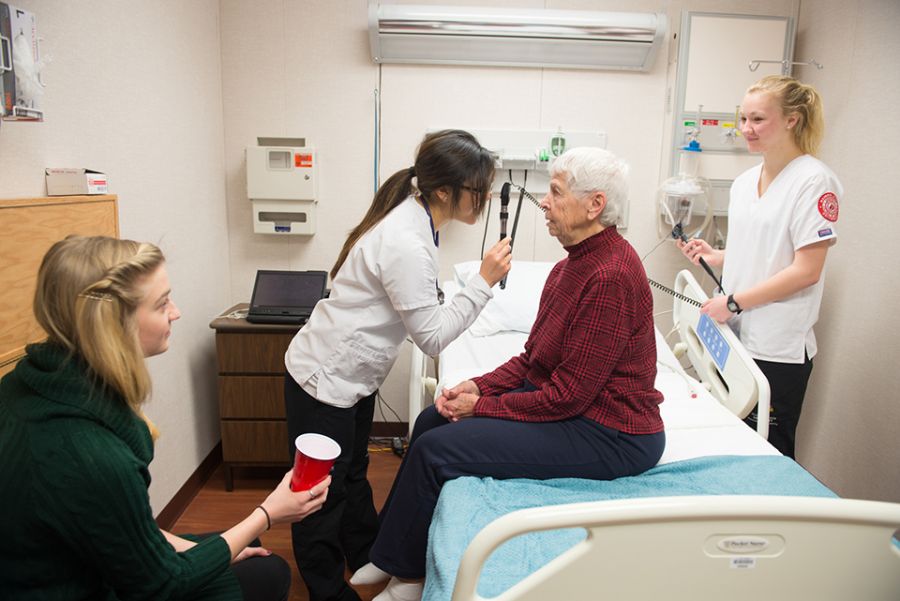Several studies have shown that poor communication among health care workers has hurt patients, resulting in their deaths in some cases. Illinois State University is trying to fix the problem by bridging the communication gap between students before they enter their health care professions.
The Mennonite College of Nursing and Department of Communication Sciences and Disorders started an innovative pilot project this semester that brought together Honors students in nursing and speech-language pathology (SLP). The project’s 16 students, split evenly between the two disciplines, learned general medical terminology and about each other’s scopes of practice in class. But more importantly they participated in several simulations together in which they assessed simulated patients with language, swallowing, or cognitive disorders.
“This is us assessing the patient and not just observing them,” said Allie Ricks, a senior speech-language pathology student. “I wish everyone could go through this experience.”
Nursing Assistant Professor Charlene Aaron collaborated with Assistant Professor Jennine Harvey-Northrop and Clinical Supervisor Rene McClure, both of the Department of Communication Sciences and Disorders, to design and implement the project. The professors said the problem in health care has been that the different specialists—nurses, doctors, speech-language pathologists, etc.—work in silos and don’t always communicate or know how to communicate with one another. This is often due to the use of different terminology or a lack of understanding of what the other professions do or the constraints under which they are working.
This project is unique to Illinois State, due to the absence of literature on interdisciplinary education between nurses and speech pathologists. The project addresses the communication problems between the two professions by measuring students’ collaborative learning through simulations, as opposed to just telling students about the communication problems through a lecture.
“We want to change the way that we teach, train, and practice in both fields,” said Harvey-Northrop, Ph.D., CCC-SLP.
Students participated in the final patient simulations the morning of April 4 at the Mennonite College of Nursing Simulation Laboratory. The patients were played by volunteer actors, many of whom are former nurses, and friends and alums of the College of Nursing.
In one case, two nursing students and an SLP student had to assess a patient with a traumatic brain injury. The students were given the case study, planned how they would assess the patient, and then had to immediately talk to him about what problems he was dealing with.
“Can’t run. Can’t work. Can’t talk. Don’t sleep very well,” he said. “That’s the A list.”

John and Joanne Maitland and Director of Nursing Simulation Sheryl Kelly monitor the patient simulations.
The professors purposely have the actors or their actor-spouses be blunt or overbearing at times, to give the students a realistic experience. It can be a pressure-packed, awkward 20 minutes for the inexperienced students—and at times cringeworthy for the professors who monitor the students from a bank of televisions fed live recordings of the patient rooms.
“(The students) can’t fake it,” said McClure, CCC-SLP ’91, M.S. ’92.
Hannah Sons, a junior SLP student, said she has learned in which areas she is lacking. The class is also instructive for the SLP students who don’t otherwise get hands-on training with patients in their undergraduate studies: They learn simple things like how to introduce themselves to patients or how to ask nurses for the patient’s vital signs.
“You don’t realize how much experience is worth until you have it,” Sons said.
Nursing sophomore Abby House said the project has been valuable because she has learned more about what speech-language pathologists actually do.
“It’s nice to have a class with people with different perspectives,” she said.
After the simulations, the professors and students gathered to review what happened. The professors asked questions to encourage the students to examine what they did and why they did it.
“It’s learning outside the classroom,” said Aaron, Ph.D., RN ’06.
The project was made possible by a gift from former state Sen. John Maitland Jr. and his wife, Joanne. John Maitland has been a long-term patient of the SLP program and both have been longtime supporters of the nursing college.
Joanne Maitland said the couple was very enthused to support such an exciting, new opportunity for the students.
“You can see where they need each other,” she said.
The professors hope the project will eventually become part of the regular curriculum. They are conducting research on the class for an academic paper and presentations and want to develop a model course that can be copied by other universities.
“We hope it will result in better outcomes for our patients,” Aaron said.
If you are interested in supporting the project, contact Jenny Ward, director of Development, at (309) 438-718 or jsward@IllinoisState.edu.
To read more about research, creative expression, and scholarship at Illinois State University, follow @ISUResearch on Twitter and look for the inaugural issue of the Redbird Scholar. The University’s new biannual magazine focused on faculty and student research will be published in print and online for the first time in September.
Kevin Bersett can be reached at kdberse@IllinoisState.edu.

